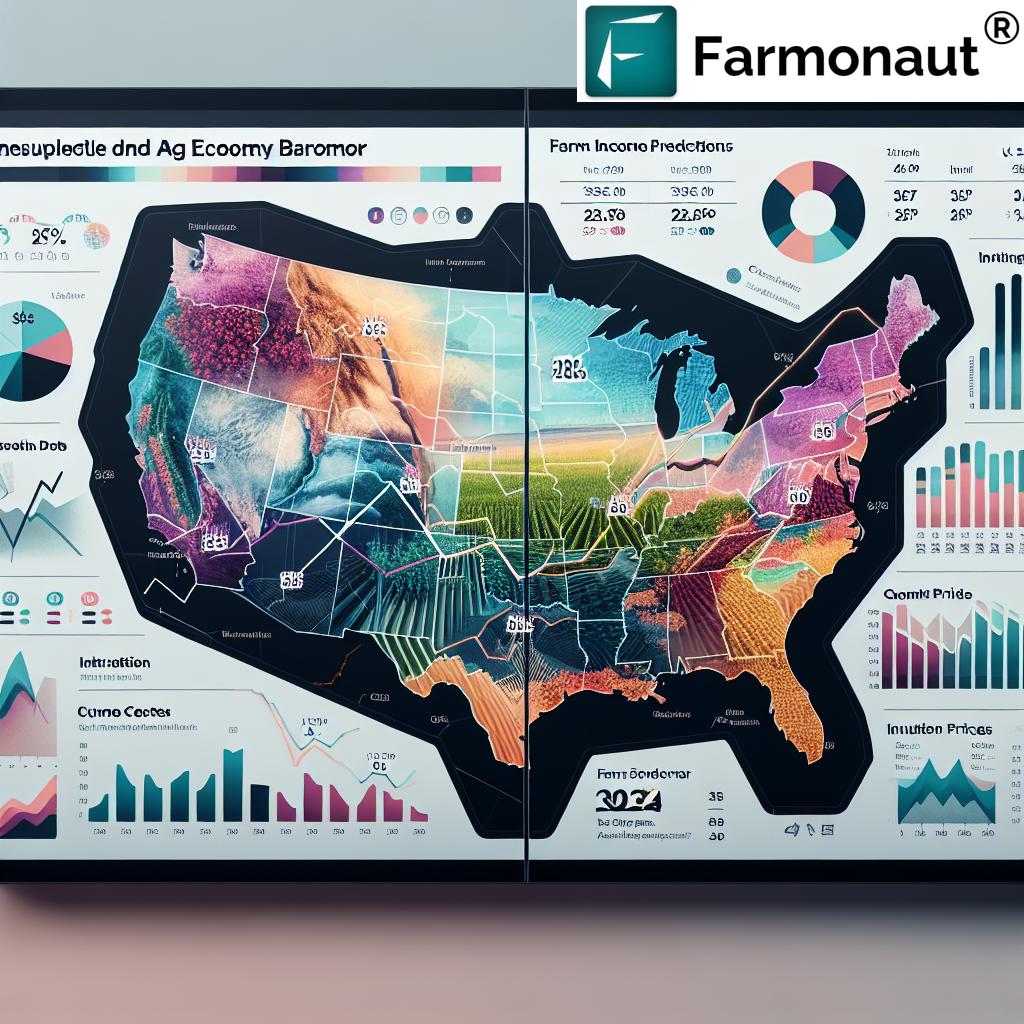2024 Ag Economy Barometer: Farmer Sentiment Plummets Amid Financial Concerns and Policy Uncertainty
“Farmer sentiment in 2024 has plummeted to its lowest levels since 2016, according to the latest farm sentiment index.”

As we delve into the latest ag economy barometer, we find ourselves facing a challenging landscape in the agricultural sector. The 2024 farm sentiment index has revealed a concerning downturn, with farmer sentiment reaching its lowest levels since 2016. This comprehensive analysis explores the key factors influencing farm income expectations, agricultural commodity prices, and input costs. We’ll examine the evolving landscape of farmland values, capital investments, and innovative practices like cover crop adoption.
At Farmonaut, we understand the importance of staying informed about these industry trends. Our satellite-based farm management solutions are designed to help farmers navigate these challenging times by providing real-time crop health monitoring and AI-driven advisory systems. Let’s explore the current state of the agricultural economy and its implications for farmers and agribusinesses.
Understanding the Ag Economy Barometer
The ag economy barometer is a crucial tool for gauging the overall health and sentiment of the agricultural sector. It takes into account various factors, including:
- Farm income expectations
- Agricultural commodity prices
- Input costs
- Farmland values
- Capital investment intentions
- Policy uncertainties
By analyzing these factors, we can gain valuable insights into the challenges and opportunities facing farmers and agricultural businesses.
Key Factors Influencing Farm Sentiment
1. Farm Income Expectations
One of the primary drivers behind the plummeting farmer sentiment is the gloomy outlook on farm income expectations. Producers are facing increased financial pressures due to a combination of factors:
- Fluctuating commodity prices
- Rising input costs
- Uncertain export markets
These challenges have led many farmers to reassess their financial projections and adopt more conservative approaches to farm management.
2. Agricultural Commodity Prices
The volatility in agricultural commodity prices has been a significant concern for farmers. Key crops such as corn, soybeans, and wheat have experienced price fluctuations, impacting farm profitability. Factors contributing to this instability include:
- Global supply and demand imbalances
- Weather-related production challenges
- Trade tensions and policy changes
At Farmonaut, we recognize the importance of staying informed about market trends. Our platform provides real-time data and insights to help farmers make informed decisions about crop selection and marketing strategies.
3. Farm Input Costs
Rising input costs have been a significant burden on farm operations. Farmers are grappling with increased expenses for:
- Fertilizers
- Pesticides
- Fuel
- Labor
- Equipment
These escalating costs have put pressure on profit margins and forced many producers to reevaluate their farming practices. Our Jeevn AI Advisory System at Farmonaut helps farmers optimize resource usage and reduce input costs through data-driven insights.
“The 2024 Ag Economy Barometer reveals significant challenges in agricultural commodity prices and input costs, affecting farm income expectations.”
Policy Uncertainty and Its Impact
Policy uncertainty has emerged as a major concern for farmers in 2024. Several key areas of policy are causing apprehension:
- Trade agreements and export markets
- Environmental regulations
- Farm support programs
- Biofuel mandates
These uncertainties make it challenging for farmers to plan for the future and make long-term investments in their operations. At Farmonaut, we strive to provide up-to-date information and analysis to help farmers navigate these policy challenges.
Farmland Values and Capital Investments
Despite the overall downturn in farmer sentiment, farmland values have shown resilience in many regions. However, the outlook for capital investments remains cautious. Farmers are carefully weighing the costs and benefits of major purchases and improvements to their operations.
Our satellite-based monitoring at Farmonaut can help farmers assess the potential of their land and make informed decisions about investments in irrigation, drainage, and other infrastructure improvements.

Innovative Practices: Cover Crop Adoption
One bright spot in the agricultural landscape is the increasing adoption of cover crops. This innovative practice offers several benefits:
- Improved soil health
- Reduced erosion
- Enhanced water retention
- Natural pest and weed suppression
At Farmonaut, we support farmers in implementing sustainable practices like cover crop adoption through our satellite-based monitoring and AI-driven recommendations.
Leveraging Technology to Navigate Challenges
In these challenging times, technology plays a crucial role in helping farmers adapt and thrive. Farmonaut’s suite of tools, including GIS technology and remote sensing, provides valuable perspectives on:
- Crop production challenges
- Pest management
- Irrigation strategies
By leveraging these technologies, farmers can make data-driven decisions to optimize their operations and mitigate risks.
Explore Farmonaut’s solutions:
The Role of Exports in Agricultural Financial Outlook
Export markets play a crucial role in the agricultural financial outlook. The current uncertainties surrounding international trade have contributed to the decreased farmer sentiment. Key factors affecting exports include:
- Trade tensions with major partners
- Currency fluctuations
- Global economic conditions
- Changing consumer preferences in export markets
Farmers and agribusinesses must stay informed about these global trends to make strategic decisions about crop production and marketing.
Adapting Farm Management Strategies
In light of the current challenges, farmers are adapting their management strategies to ensure long-term sustainability and profitability. Some key approaches include:
- Diversification of crops and income streams
- Precision agriculture techniques to optimize resource use
- Risk management through crop insurance and hedging
- Adoption of sustainable practices to reduce input costs
Farmonaut’s platform supports these strategies by providing real-time data and insights to inform decision-making. Our API and API Developer Docs enable seamless integration of our data into existing farm management systems.
The Future of Sustainable Farming Practices
Despite the current challenges, the agricultural sector continues to move towards more sustainable farming practices. This shift is driven by:
- Consumer demand for environmentally friendly products
- Regulatory pressures
- The need to reduce input costs
- Long-term soil health and productivity concerns
Farmonaut’s satellite-based monitoring and AI advisory systems support farmers in implementing and optimizing sustainable practices, helping to ensure the long-term viability of their operations.
Agricultural Economic Indicators Comparison (2016 vs. 2024)
| Indicator | 2016 Value | 2024 Value |
|---|---|---|
| Farmer Sentiment Index | 85 | 72 |
| Farm Income Expectations | Moderate | Low |
| Corn Price (per bushel) | $3.50 | $4.20 |
| Soybean Price (per bushel) | $9.50 | $11.30 |
| Fertilizer Cost Index | 100 | 145 |
| Fuel Cost Index | 100 | 130 |
| Farmland Value (per acre) | $3,000 | $3,500 |
| Capital Investment Intentions | Moderate | Low |
| Cover Crop Adoption Rate | 5% | 12% |
| Export Market Confidence | High | Low |
| Policy Uncertainty Index | 90 | 120 |
This table provides a clear comparison of key agricultural economic indicators between 2016 and 2024, highlighting the significant changes in the sector over the past eight years.
Leveraging GIS and Remote Sensing for Farm Management
Geographic Information Systems (GIS) and remote sensing technologies have become invaluable tools for modern farm management. These technologies offer several benefits:
- Precise mapping of field boundaries and crop health
- Early detection of pest and disease outbreaks
- Optimization of irrigation and fertilizer application
- Yield prediction and harvest planning
Farmonaut’s platform integrates these technologies to provide farmers with actionable insights for improved decision-making and resource management.
Addressing Crop Production Challenges
Farmers face numerous crop production challenges that impact their overall sentiment and financial outlook. Some of the key issues include:
- Climate change and extreme weather events
- Soil degradation and nutrient depletion
- Emerging pest and disease threats
- Water scarcity and irrigation efficiency
Farmonaut’s satellite-based monitoring and AI-driven insights help farmers identify and address these challenges proactively, minimizing their impact on crop yields and farm profitability.
The Impact of Agricultural Policy on Farm Management
Agricultural policies have a significant influence on farm management strategies and overall sector performance. Key policy areas affecting farmers include:
- Subsidy programs and price supports
- Environmental regulations and conservation requirements
- Trade policies and export promotion
- Research and development funding
Staying informed about policy changes and their potential impacts is crucial for effective farm management. Farmonaut’s platform provides up-to-date information and analysis to help farmers navigate the complex policy landscape.
Optimizing Irrigation Strategies
Efficient irrigation is critical for maximizing crop yields while conserving water resources. Advanced irrigation strategies include:
- Precision irrigation based on real-time soil moisture data
- Deficit irrigation techniques for water-stressed regions
- Integration of weather forecasts for optimal timing
- Use of drought-resistant crop varieties
Farmonaut’s satellite-based monitoring provides valuable data on soil moisture levels and crop water stress, enabling farmers to implement more effective irrigation strategies.
Managing Pests, Diseases, and Weeds
Effective management of pests, diseases, and weeds is essential for maintaining crop health and maximizing yields. Integrated pest management (IPM) approaches include:
- Regular monitoring and early detection
- Use of biological control agents
- Targeted application of pesticides
- Crop rotation and diversification
Farmonaut’s platform supports these efforts by providing early detection of pest and disease outbreaks through satellite imagery analysis and AI-driven insights.
The Role of Data in Modern Farm Management
Data-driven decision-making has become central to modern farm management. Key areas where data plays a crucial role include:
- Yield forecasting and production planning
- Resource allocation and input optimization
- Financial planning and risk management
- Compliance with regulations and certification requirements
Farmonaut’s comprehensive data collection and analysis capabilities empower farmers to make informed decisions based on real-time, accurate information.
Conclusion: Navigating the Challenges Ahead
The 2024 Ag Economy Barometer paints a challenging picture for the agricultural sector, with farmer sentiment at its lowest levels since 2016. However, by leveraging advanced technologies, adopting sustainable practices, and staying informed about market trends and policy changes, farmers can navigate these challenges and build resilience for the future.
At Farmonaut, we remain committed to supporting farmers with cutting-edge satellite-based farm management solutions, AI-driven insights, and real-time data to optimize their operations and improve decision-making. By embracing innovation and adapting to changing conditions, the agricultural sector can overcome current challenges and emerge stronger in the years to come.
FAQ Section
Q: What is the Ag Economy Barometer?
A: The Ag Economy Barometer is a measure of farmer sentiment that takes into account various factors such as farm income expectations, commodity prices, input costs, and policy uncertainties to gauge the overall health of the agricultural sector.
Q: Why has farmer sentiment dropped to its lowest levels since 2016?
A: The drop in farmer sentiment is due to a combination of factors, including fluctuating commodity prices, rising input costs, policy uncertainties, and challenges in export markets.
Q: How can farmers adapt to the current challenges in the agricultural sector?
A: Farmers can adapt by diversifying their crops, adopting precision agriculture techniques, implementing sustainable practices, and leveraging technology for data-driven decision-making.
Q: What role does technology play in modern farm management?
A: Technology, such as satellite-based monitoring, GIS, and AI-driven insights, plays a crucial role in optimizing resource use, improving crop health monitoring, and enhancing overall farm productivity.
Q: How does Farmonaut support farmers in these challenging times?
A: Farmonaut provides farmers with real-time crop health monitoring, AI-based advisory systems, and data-driven insights to help optimize farm operations, reduce costs, and improve decision-making.
Farmonaut Subscriptions






